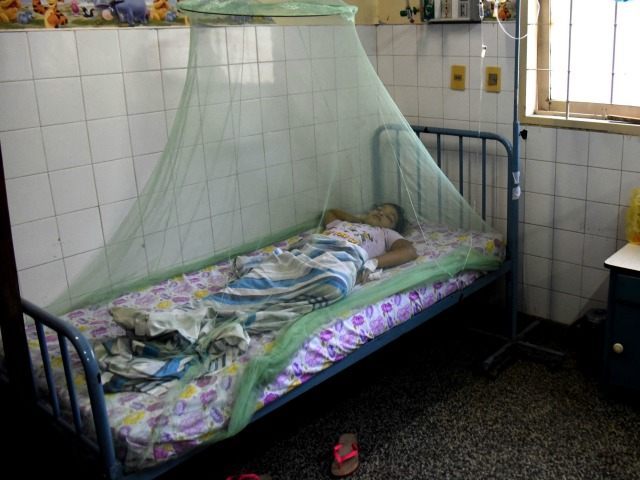Media outlets in Venezuela are reporting that at least eleven patients nationwide have died of Guillain-Barré syndrome, though the government’s Health Ministry has yet to report any of the cases, and most appear linked to the Zika virus pandemic ravaging Latin America.
El Nacional reports that these eleven deaths have been recorded throughout Venezuela, but the national Health Ministry “has yet to admit any deaths” related to the Zika virus. All eleven died of Guillain-Barré syndrome, a condition in which the body’s immune system turns on its nervous system, causing severe joint and muscle pain.
The latest death, in Maracay, was that of a 38-year-old man who did not have access to treatment for the syndrome. “Neither of the two known treatments were available to him: there is a shortage of immunoglobulin to apply intravenously [and] human albumin as an alternative therapy.” Venezuelan authorities told the newspaper that 90 percent of known cases nationwide of Guillain-Barré involve patients with hypertension or diabetes, dismissing Zika as a potential reason for the surge in cases. Last week, however, they told Reuters that there were at least 255 cases of the syndrome suspected of having ties to Zika.
José Félix Oletta, who works with the NGO Let’s Defend Epidemiology Network, tells Venezuela outlet La Patilla that their data collection suggests that currently, over 3,000 patients in Venezuela have Guillain-Barré.
Reuters has found at least one case of a man who was diagnosed with Guillain-Barré after exhibiting symptoms of carrying the Zika virus. Roberto Miguez’s face is paralyzed, and he is bedridden, according to his sister. This follows complaints of symptoms similar to Zika. The family has been waiting for days for immunoglobulin to commence treatment, but have yet to receive any indication that they will find it within the nation’s borders. Reuters notes that the only domestic manufacturer of immunoglobulin has not produced it since August.
“Delaying treatment can result in profound neurologic damage including paralysis of the face, arms and legs, loss of sensation in the extremities and respiratory failure requiring intubation and admission to an intensive care unit for a prolonged period (weeks to months),” Carlo Tornatore, professor of Neurology at Georgetown University School of Medicine, tells Reuters.
“The national government must accept we are in a humanitarian crisis in the health sector, with patients dying across our territory for lack of medicines,” Freddy Ceballos, the president of Venezuela’s Pharmaceutical Federation, said in January. The Federation published a report indicating that up to 85 percent of the nation’s pharmacies would be forced to close due to medical shortages, and that a list of over 150 medications – from common painkillers to advance cancer medication – were nowhere to be found in Venezuela. To make due, some pharmacies had begun selling veterinary medicine to human patients.
In addition to the severe medical shortages plaguing Venezuela, international observers have protested that the socialist government is not properly monitoring cases of Zika in the country. Colombian Health Minister Alejandro Gaviria accused Venezuelan officials of having “no systematic reporting of the data” on the Zika outbreak in the Caribbean nation, calling it a “serious problem” this week.
The Venezuelan government claims it is monitoring Zika cases, but has documented significantly fewer cases than its neighbors. According to the Venezuelan Health Ministry, the nation has diagnosed 4,700 cases of Zika, compared to over 20,000 in Colombia and 1.5 million in Brazil. Reuters notes the real number of Zika cases in Venezuela is estimated to be closer to the 240,000-500,000 range.
The Venezuelan government has begun Zika awareness campaigns, but none highlight the need for more generalized access to medication. On its official state-run media site, the government boasts of the “National Integral Plan Against Dengue, Zika, and Chikungunya” (all spread by the same species of mosquito), which involves “the collection of waste, garbage, and rubble, to later proceed with fumigation.”

COMMENTS
Please let us know if you're having issues with commenting.